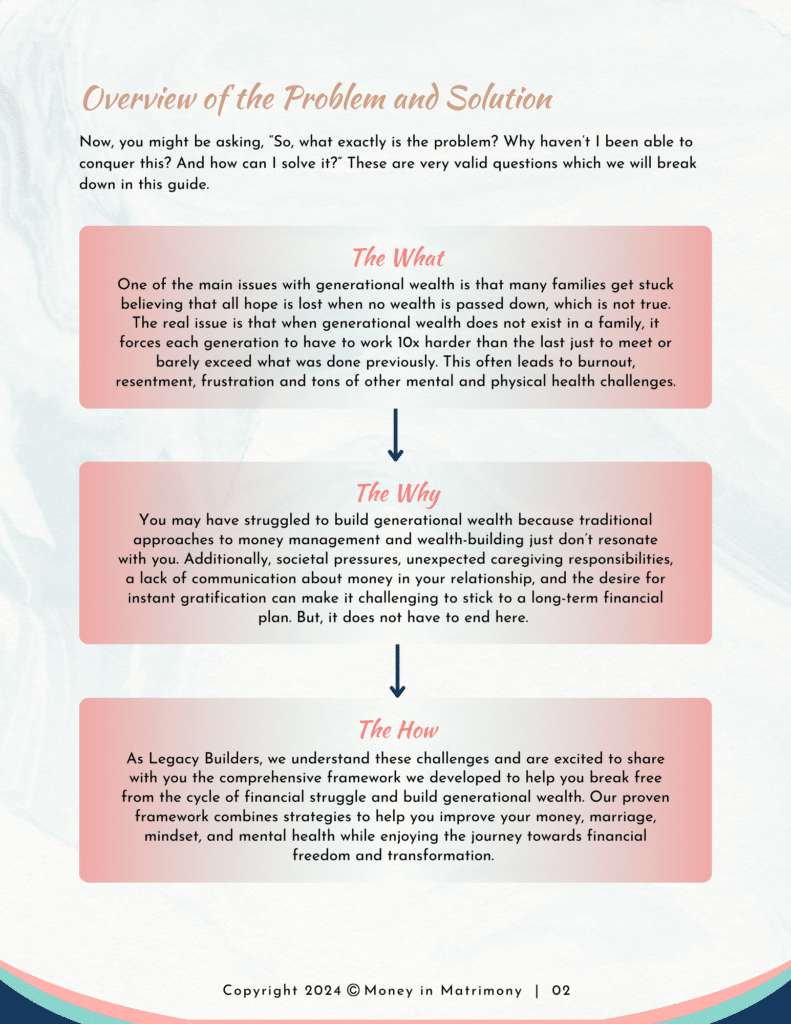Top 3 Ways to Develop Solid Financial Boundaries within Your Marriage
This post may contain affiliate links which means that I will receive a small commission for purchases made through those links, at no cost to you.

GENERAL BOUNDARIES
Creating boundaries is a must if we want to live a fulfilling life. Boundaries help improve our mental, physical, and spiritual well-being. Whenever we don’t set boundaries in every aspect of our lives, people or things tend to take advantage of our time, our money, and our personal space. If you and your spouse are struggling with financial restrictions, then here are the top 3 ways to develop solid financial boundaries within your marriage.
- Decide how to handle requests from family and friends
- Set clear expectations about what should be discussed in public
- Be honest with your spouse about what you are willing to commit to
FINANCIAL BOUNDARIES
Developing financial boundaries are just as important. So, you might be asking what this concept is. Financial boundaries are where you and your spouse draw the line in regards to money. They are limits that provide guidance on what you should or should not do as it relates to money within your marriage. They can also serve as expectations discussed and agreed upon by you and your spouse.
Let’s go into a little more detail about the top 3 ways to develop solid financial boundaries within your marriage.

1. Decide How to Handle Requests from Family and Friends
Loaning money to family and friends is always a big issue! So I wanted to tackle this one first. My husband and I have been married for over 12 years, so we know this problem all too well. When we first got married and combined our finances, we had not taken the time to sit down and discuss how we would handle financial requests from family and friends. Of course, there’s always going to be one or two family members who have true emergencies and need your help until they get paid. However; in our case, we had both, but the mutual friend was the absolute worst! I will save the conversation about the mutual friend for a later post.
So how did we handle this? Years after we were married, we finally had a heart to heart discussion and decided that we would only help those with truly genuine needs.
For instance, we had a family member who had just cashed their paycheck and was on the way to purchase a money order to pay the rent. However; before making it to the store to buy the money order, the family member lost the wallet with all of the cash. That family member called the hubby and I in tears because the rent was due the same day. Since that was an emergency issue, and the family member had never asked us for anything in the past, we decided to withdraw the funds from our savings account in order to help.
On the other hand, we had another family member who called us every month. We discovered that this family member was spending their money on wants and not taking care of their needs. Needless to say, we still don’t typically answer that family member’s phone calls. If you have a family member like mine, who just won’t stop asking for money, then you might want to check out these 3 nice ways to keep family and friends from asking for money.

2. Set Clear Expectations about What Should be Discussed in Public
Take some time to discuss what is off-limits outside of your marriage. Decide whether or not it is okay to tell your co-workers that you have $62,000 in debt and therefore; you will no longer be able to go out to eat for lunch. Figure out what you and your spouse both feel comfortable sharing with others. John and I try our best not to discuss numbers. We don’t mind discussing concepts, but we would rather not offend or intimidate anyone. So we try to keep those personal details to ourselves.
A few years ago, another friend of ours stopped by the house for a little while. This was his first time visiting. We gave him a quick tour and he complimented us on how nice it was. The next thing he asked was, “So, how much did ya’ll pay for this house?” I was shocked! I mean, if he really wanted to know, he could’ve just googled it. That was just too personal for me. So I responded with, “Well, we got it for a good deal and we stayed under our budget.” OMG! Folks are just too nosey! Mind your business! lol

3. Be Honest with your Spouse about What you are Willing to Commit TO
It is not always healthy to allow one spouse to dictate what will happen in regard to the finances. Any decisions should be discussed among both partners and agreed upon. If you feel strongly about taking one action and your partner is leaning 100% in the opposite direction, then further discussion is needed. If you don’t feel comfortable agreeing to a specific financial boundary, then try to find a happy medium. See if you and your partner can meet somewhere in the middle. The hubby and I always find that it’s best to sleep on tough decisions and bring it back to the table in a few days.
Final Thoughts
I have provided you with 3 actionable ways to develop solid financial boundaries within your marriage which can be implemented this week. Here’s a quick recap: Decide how to handle requests from family and friends, Set clear expectations, and Be honest with your spouse about what you are willing to commit to. Sit down with your spouse and discuss any financial issues that may have arose in the past and decide on a clear set of boundaries. If you have a plan in place, you won’t have to struggle to make decisions in the future.








